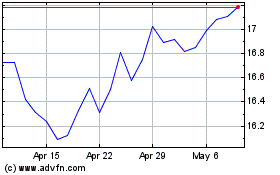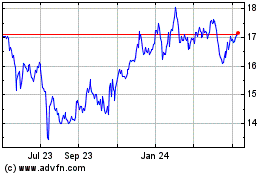By Brent Kendall and Drew FitzGerald
This article is being republished as part of our daily
reproduction of WSJ.com articles that also appeared in the U.S.
print edition of The Wall Street Journal (December 7, 2018).
WASHINGTON -- A federal appeals court voiced skepticism Thursday
of the Justice Department's bid to roll back AT&T Inc.'s
acquisition of Time Warner.
During an oral argument that spanned nearly two hours, all three
judges on a panel of the U.S. Court of Appeals for the District of
Columbia Circuit asked tough questions of the DOJ, which argues the
more than $80 billion deal will harm competition in the pay-TV
industry.
The judges repeatedly noted that the court could rule for the
government only if the trial judge made obvious and serious errors
in siding with AT&T.
"Our standard is clear error," said Judge Judith Rogers.
"Where is the plain error?" Judge David Sentelle asked, then
later suggested to the Justice Department that there wasn't
one.
The department sued last year to block the transaction, one of
the biggest government merger lawsuits in recent memory. U.S.
District Judge Richard Leon roundly rejected the government's
claims in June following a six-week trial. The companies completed
the transaction a few days later, but the government is continuing
to challenge it.
The so-called vertical deal combined AT&T's wireless and
pay-TV businesses -- including satellite service DirecTV -- with
Time Warner's entertainment portfolio: the Warner Bros. movie
studio, HBO and the Turner networks, which include TBS, TNT and
CNN.
Both at trial and on appeal, the Justice Department's primary
contentions focused on the Turner networks, arguing that AT&T
could raise its rivals' costs by charging more for those channels
once it owned them. A negotiation impasse would have a silver
lining for AT&T, because any potential blackout of Turner on
other pay-TV systems could lead subscribers to switch to an
AT&T-owned service, the department alleged.
With the combination of AT&T and Time Warner, "the nation's
largest TV distributor and a TV programmer with critically
important content will be able to extract hundreds of millions of
dollars more for TV programming because they can threaten to poach
the rivals' customers if they don't pay up," Justice Department
lawyer Michael Murray said Thursday.
The appeals court, however, questioned whether the threat of a
blackout of the Turner networks really was a credible threat for
AT&T to make.
"If you have any empty threat of a blackout, you're not going to
get a heck of a lot of leverage out of that," Judge Sentelle
said.
Judge Robert Wilkins questioned whether the blackout threat was
removed from the equation because Turner has pledged that it will
submit to arbitration any programming disputes over network
carriage fees. He cited factual findings made by the trial court
that the arbitration pledge would have a real-world impact on the
marketplace and the bargaining position of the parties.
"How can we just ignore that?" Judge Wilkins asked.
Mr. Murray said there were too many uncertainties surrounding
AT&T's arbitration offer and that it wasn't an adequate
solution.
It isn't clear whether other pay-TV providers are eager or
willing to arbitrate with AT&T in the event of a pricing
dispute. AT&T said earlier this year that only a handful of the
roughly 1,000 cable, satellite and online TV distributors had
accepted that offer, which it modeled after similar agreements
offered previously by Comcast Corp. when that company took control
of NBCUniversal in 2011.
Judge Wilkins later suggested that the trial judge may have made
some errors in his 172-page decision for AT&T, but he
questioned whether they were substantial enough to change the
outcome or require that the case be sent back to the trial court
for more proceedings.
Peter Keisler, a lawyer representing AT&T, argued the
government's case against the deal fell apart during trial. And he
said Turner's promise to arbitrate disputes with other pay-TV
distributors takes the threat of a blackout "off the table."
"We will honor it," Mr. Keisler said. "We don't make an offer
like this in the marketplace and intend to say, 'We had our fingers
crossed behind our back when we made it.'"
An AT&T spokesman said in a statement that "distributors
collectively serving more than 10 million pay-TV customers have
accepted Turner's binding offer for arbitration and we expect other
distributors to do the same as their contracts come up for renewal
over the next several years."
A ruling is expected in the coming months. AT&T has agreed
to temporary rules that would make it easier to unwind the deal if
the D.C. Circuit were to reverse Judge Leon's decision. Those
conditions expire on Feb. 28.
Justice antitrust chief Makan Delrahim attended Thursday's
hearing, sometimes passing notes to Mr. Murray at the lectern.
AT&T Chief Executive Randall Stephenson was in Washington,
D.C., Thursday but didn't come to court, though the company's
general counsel, David McAtee, watched his litigators defend the
case.
Write to Brent Kendall at brent.kendall@wsj.com and Drew
FitzGerald at andrew.fitzgerald@wsj.com
(END) Dow Jones Newswires
December 07, 2018 02:47 ET (07:47 GMT)
Copyright (c) 2018 Dow Jones & Company, Inc.
AT&T (NYSE:T)
Historical Stock Chart
From Mar 2024 to May 2024

AT&T (NYSE:T)
Historical Stock Chart
From May 2023 to May 2024
